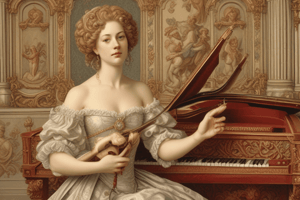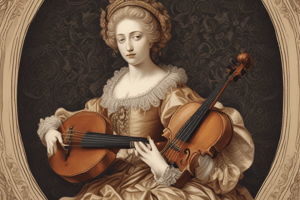Podcast
Questions and Answers
Which composer is associated with the String Quartet, Op. 33, No. 2, 4th movement?
Which composer is associated with the String Quartet, Op. 33, No. 2, 4th movement?
- Haydn (correct)
- Corelli
- Mozart
- Purcell
In which piece can you find Dido's lament?
In which piece can you find Dido's lament?
- Concerto in D Major, Op. 6, No. 4
- Cosi Fan Tutte (correct)
- Symphony No. 40 in G minor, K. 550
- String Quartet, Op. 33, No. 2
Which work showcases an Adagio and Allegro in D Major?
Which work showcases an Adagio and Allegro in D Major?
- Concerto in D Major, Op. 6, No. 4 (correct)
- Cosi Fan Tutte
- String Quartet, Op. 33, No. 2
- Symphony No. 40 in G minor, K. 550
Which composer's work includes an excerpt from 4:46-7:00 in the opera genre?
Which composer's work includes an excerpt from 4:46-7:00 in the opera genre?
Which piece is associated with the Symphony No. 40 in G minor?
Which piece is associated with the Symphony No. 40 in G minor?
The Baroque era is characterized by ornate musical decorations and a strong use of __________.
The Baroque era is characterized by ornate musical decorations and a strong use of __________.
Which aspect of opera developed significantly during the Baroque and Classical eras?
Which aspect of opera developed significantly during the Baroque and Classical eras?
Which genre is associated with the term 'Emfindsamer Stil'?
Which genre is associated with the term 'Emfindsamer Stil'?
Which composer is known for their contributions to French Baroque Music?
Which composer is known for their contributions to French Baroque Music?
In the context of the Baroque era, what does 'basso continuo' refer to?
In the context of the Baroque era, what does 'basso continuo' refer to?
Which musical form does a 'da capo aria' represent?
Which musical form does a 'da capo aria' represent?
Arcangelo Corelli is associated with which musical trend or genre?
Arcangelo Corelli is associated with which musical trend or genre?
What characterizes music in the 'Galant Style'?
What characterizes music in the 'Galant Style'?
'Oratorio' is a vocal genre typically accompanied by what?
'Oratorio' is a vocal genre typically accompanied by what?
Study Notes
String Quartet, Op. 33, No. 2, 4th movement
- Associated with Ludwig van Beethoven
Dido's Lament
- Found in Henry Purcell's opera Dido and Aeneas
Adagio and Allegro in D Major
- Found in Wolfgang Amadeus Mozart's Piano Sonata No. 11 in A Major, K. 331
Excerpt from 4:46-7:00 in the opera genre
- Associated with Giuseppe Verdi's opera Rigoletto
Symphony No. 40 in G minor
- Associated with Wolfgang Amadeus Mozart
Baroque Era
- Characterized by polyphony, which uses multiple independent melodies played simultaneously
Opera Development
- The recitative underwent significant development in the Baroque and Classical eras, transforming from a relatively simple declamation to a more expressive and elaborate form
Emfindsamer Stil
- Associated with the Classical Era
French Baroque Music
- Jean-Baptiste Lully is known for his contributions.
Basso Continuo
- Refers to a continuous bass line used in Baroque music, typically played by a harpsichord or organ.
- The bass line supports the melody and harmonies, often improvising accompaniment.
Da Capo Aria
- Represents a three-part musical form with a repeated first section, often with embellishments or variations
Arcangelo Corelli
- Associated with Italian Baroque music, particularly violin concertos and chamber music
Galant Style
- Characterized by simpler melodies and harmonies, a lighter texture, and a focus on dance rhythms, contrasted with the more complex and ornamented styles of the Baroque era.
Oratorio
- Typically accompanied by a small orchestra and a chorus
Studying That Suits You
Use AI to generate personalized quizzes and flashcards to suit your learning preferences.
Related Documents
Description
Prepare for your MUS 100 Test #2 by reviewing key definitions related to the Baroque and Classical Eras, specifically from Chapter 6-7. Topics include Monody, Recitative, Concerto Grosso, Chamber Music, Oratorio, Sonata, Da capo aria, Symphony, and more.




